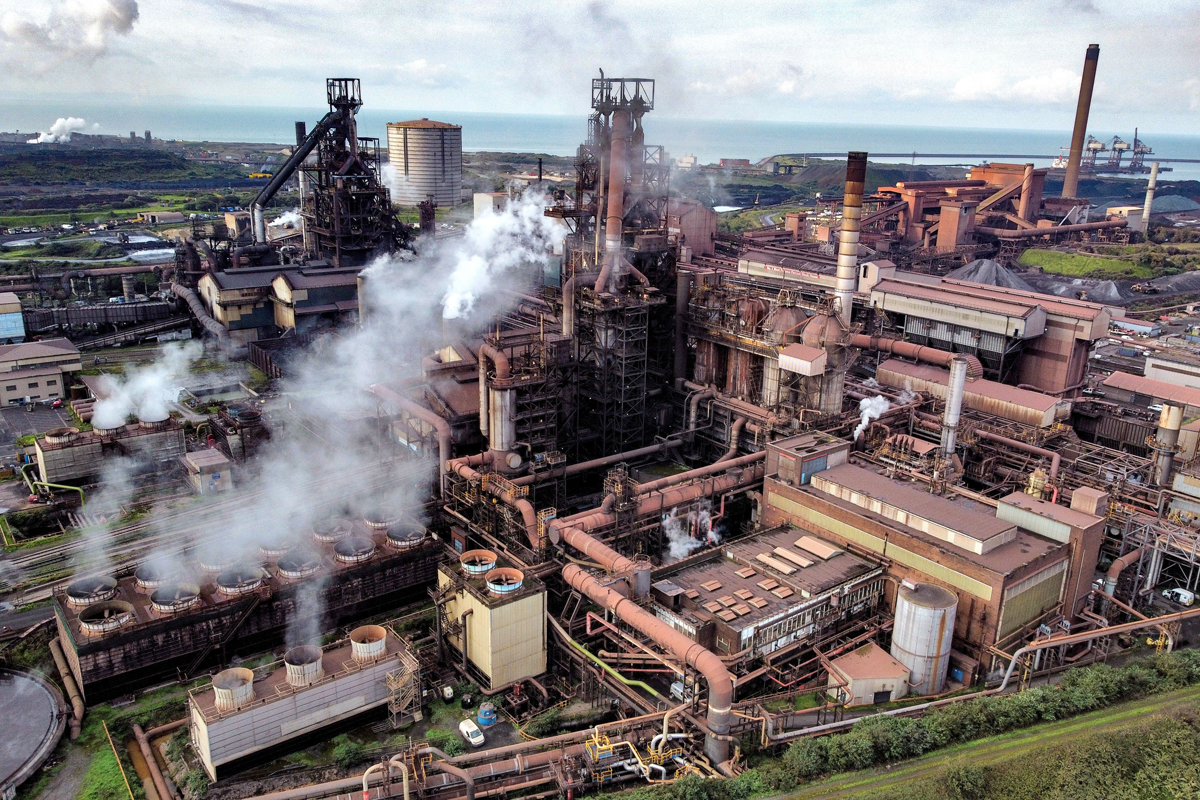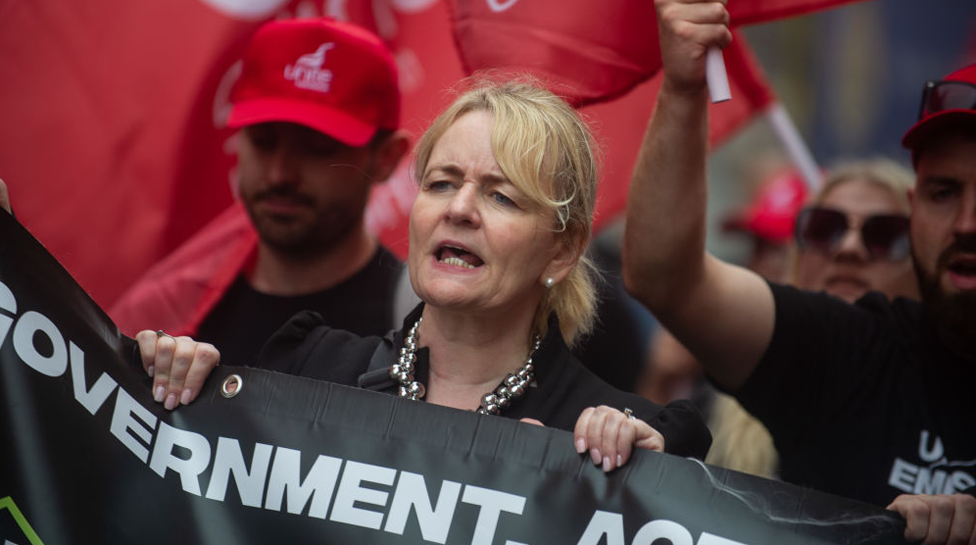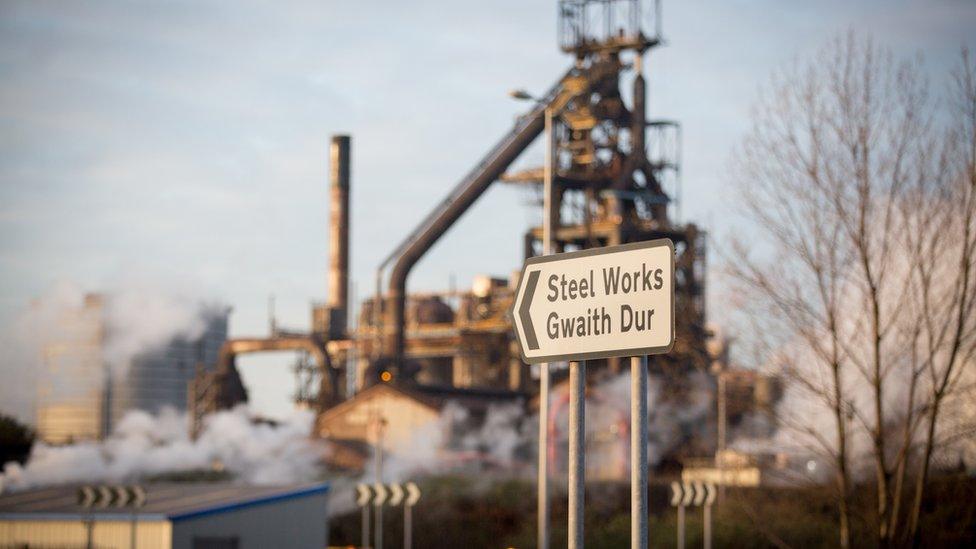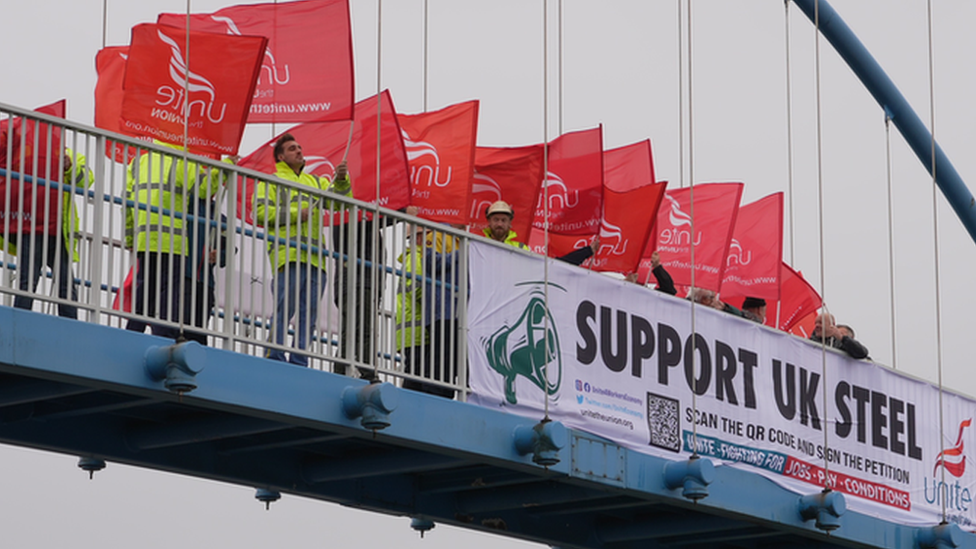Tata Steel: Unions split on Port Talbot rescue plan
- Published
- comments

Port Talbot employs 3,000 people - half Tata's UK workforce
Unions representing Port Talbot steelworkers are split over an alternative plan to decarbonise the Tata Steel site.
Two unions have said proposals prepared by consultants Syndex would "safeguard the future" of the site with no compulsory redundancies.
But a third, Unite, has changed its stance and has publicly rejected the plan, calling it a "strategy for job cuts".
Tata Steel said talks were ongoing.
On 1 November, unions said Tata Steel was planning to end blast furnace production in Port Talbot by April 2024 with the loss of 3,000 jobs.
Tata cancelled a planned press conference where the plan was expected to be announced.
It’s feasible, open to proper scrutiny and crucially avoids any non-compulsory redundancies.
The company had already committed to replacing the blast furnaces with an electric arc furnace which will melt scrap steel, rather than producing virgin steel from iron ore.
Port Talbot steelworks is Wales' largest emitter of carbon and the company and unions are committed to decarbonising the site, but disagree on how it is achieved.
All three unions asked Syndex to prepare an alternative decarbonisation plan for Tata Steel's UK operations, which was endorsed by representatives of Community, GMB and Unite.
It was presented to the company's senior management by representatives of the unions in London on 17 November and involved maintaining one blast furnace in Port Talbot with about 700 job losses that the unions believe could be achieved through voluntary redundancies and redeployment.

Sharon Graham of Unite first announced the union's opposition earlier this month
But on 18 November, Unite's general secretary Sharon Graham announced her opposition to the plan.
Community and GMB have now published a summary of the Syndex plan, saying it would "protect more than 2,300 jobs over a decade and would see no compulsory redundancies in Port Talbot".
But Unite's Wales regional secretary Peter Hughes has now said: "The Syndex plan is a strategy for job cuts and Unite in no way accepts any proposal that seeks to decimate the steel industry."
Unite said it had its own plan for steelmaking which would "transform the UK into the global green steel capital".
Following last week's meeting with all three unions, Tata Steel committed to assessing the Syndex plan.
As well as maintaining one of the blast furnaces until 2032, the Syndex plan includes assessing alternative models for virgin steel production which could be constructed at a later date.
Community general secretary Roy Rickhuss said its alternative plan "had been agreed by all the steel unions, can safeguard the future of Port Talbot steelmaking and protect all the downstream plants and - crucially - it can be delivered with no compulsory redundancies".
'More in common'
GMB general secretary Gary Smith said the plan "offers a credible path" to a decarbonised future for Port Talbot, calling it "the plan Port Talbot workers want".
Tata Steel said there was a well-established multi-union consultation arrangement - the UK Steel Committee - which involved national representatives from the Community, GMB and Unite unions and it met with the company on 17 November to start discussions on its proposals.
A spokesperson added: "We agreed to further detailed conversations on specific items within their proposal and these discussions are ongoing."
Welsh economy minister Vaughan Gething said the Welsh government was very clear that it wanted to see the maximum number of jobs maintained for the longer term.
"It really does matter that the conversation is a serious one, with meaningful engagements," he said.
"I think there is more in common in the trade union position, that's my understanding, than can be seen as a nuance between them.
"Either way, that does not mean that either the company or the UK government should walk away from the conversation that still has to conclude on what the future could be."
He said he wanted to see a credible plan for decarbonisation that "does not offshore Welsh jobs and does not offshore emissions that will simply take place in a different part of the world".

THE CROSSBOW KILLER: Investigating the case of a Welsh murder stranger than fiction
DEATH OF A CODEBREAKER: The man found naked & dead inside a bag

- Published3 November 2023

- Published17 November 2023

- Published2 November 2023
